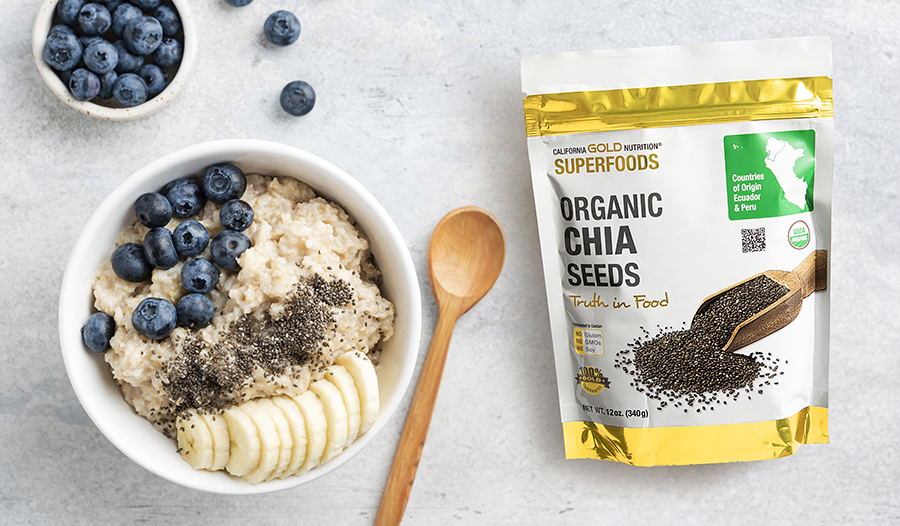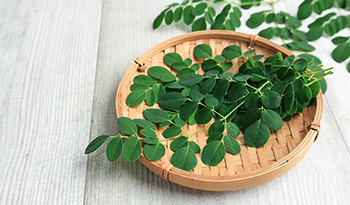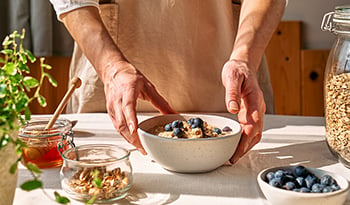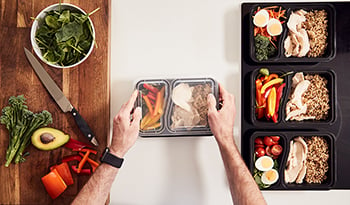A Naturopathic Doctor Shares 8 Pantry Staples from iHerb

These healthy grocery items might be considered necessary staples in any health-minded individual’s kitchen cabinets or pantry.
1. Hydration Enhancers
Everyone knows the value of drinking water – it is a critical factor in helping our body function properly. That said, personally, I do not drink much plain water. I need to make it more “interesting.” How do I do that? By utilizing hydration enhancers, both at home and while on the golf course. Here are two of my favorites:
- Real lemon and fruit infusions. These water enhancers come in packets. Lemonade versions come in three flavors – original lemonade, strawberry lemonade, and raspberry lemonade. Fruit infusions come in a variety of flavors. Here is why I love these drink mix packets. First, they taste great! They simply provide fresh flavor from real lemon juice and other natural flavors that are actually good for you! And there is really no limit to how many I can consume, which is important when I am out golfing because I may drink six to ten 16-ounce bottles of water.
- Electrolyte supplements. There are some great choices available. I prefer electrolyte mixes that are low in sodium and high in potassium. These sorts of drink mixes also come in a variety of fruit flavors in both tubs and boxes of packets. Some of the key features are that these products make plain water taste great. They mix easily, provide lots of potassium, and should be low in sodium. Versions are available that also contain zero calories, only natural flavors, and no added sugar or artificial ingredients.
2. Low Sodium Sea Salt
Speaking of salt, the truth is that too much sodium chloride (salt) is not healthy, no matter what the source including sea salt or pink Himalayan salt or Celtic sea salt that is healthy for you. The issue is too much sodium. The body only needs about 200 mg or roughly 10-30 times less than the average daily sodium intake. And while sodium intake is sky high, the average daily potassium intake is less than 2,500 mg a day. That amount is about half of the 4,700 mg recommended intake level for adults made by many health organizations. Most of us need to be restricting our sodium intake while boosting potassium and here is an easy way to do just that. Just use high potassium, low sodium sea salt. The ratio of potassium to sodium should be roughly 2:1 so that it tastes like clean salt with no metallic aftertaste.
3. Low-Calorie Natural Sweeteners
Most people have sweet tooth, I am no exception. But I definitely avoid sugar and artificial sweeteners. Here are some of the more popular natural sweeteners followed by my favorite:
- Stevia is a natural sweetener extracted from the Stevia rebaudiana plant. Some stevia compounds are 300 times sweeter than sugar, and stevia has an excellent safety profile. The rap on stevia is that it has a bit of an aftertaste..
- Monk fruit or luo han guo extract is not as popular as stevia, but it may actually be a little sweeter without the bitter aftertaste.
- Sugar alcohols or polyol sweeteners like erythritol, xylitol, sorbitol, mannitol, and maltitol are extremely safe at moderate dosages. However, because they are poorly absorbed in higher dosages (e.g., greater than 10 grams daily) they can cause gastrointestinal symptoms ranging from mild discomfort to severe diarrhea, especially in children because of their smaller size. I like erythritol and xylitol the best of this bunch.
- Allulose is a naturally occurring sugar that may be the “Holy Grail” of sweeteners. Allulose is about 80% as sweet as sugar but has only 1/10th the calorie level of sucrose or fructose. Allulose is absorbed from the gastrointestinal tract, so it does not cause the gas and bloating that sugar alcohols do. Even though allulose is absorbed, it is not utilized by the body as an energy source. About 70% of the allulose that is ingested is excreted in the urine. What I really like about allulose, and why it is my favorite sweetener, is that it actually exerts positive effects on blood sugar control and may actually help promote fat loss through beneficial effects on the liver. A sweetener that promotes weight loss and is good for you is a major nutritional breakthrough. Allulose is made through a natural enzymatic reaction or through a GMO process. Obviously, look for the non-GMO version.
4. Organic Herbs and Spices
One of the great ways to make your diet fight aging in an aggressive way, as well as add more variety to it, is the liberal use of herbs and spices. There are just so many health-promoting effects produced by these foods, e.g., they are really important agents to fight inflammation and promote detoxification. I have a HUGE caveat, however. Be sure to use organic herbs and spices.
The dirty secret about non-organic versions is that they are often loaded with pesticides, anti-caking agents that are NOT good for you, and additional fillers such as MSG (monosodium glutamate). Non-organic spices also commonly use two sterilization methods before the spices hit the market: chemical fumigation and irradiation. In contrast, organic spices use only safe sterilization methods like steaming.
5. Raw Nuts and Seeds
The health benefits of raw nuts and seeds do not get enough attention as far as I am concerned. You absolutely must make them a part of your daily diet. But here is the thing, they are so nutritionally powerful you want to mix it up. They have overlapping nutritional content and health benefits. So, it is important to have a wide assortment to rotate through. My pantry always has the following in my order of preference: walnuts, whole and ground flaxseeds (refrigerate to keep fresh), almonds, pistachios, pumpkin seeds, pecans, chia seeds, sunflower seeds, cashews, Brazil nuts, pine nuts, and hemp hearts.
6. Good Oils
Health-promoting oils for cooking and salad dressings are a must in a healthy pantry. The best oils to cook with in baking recipes, stir-fries, and sautés, are monounsaturated oils like olive, macadamia nut, and avocado oil. Coconut oil is also a good choice, but I am partial to using monounsaturated oils for cooking. I recommend coconut oil as a spread and to add to hot beverages like coffee, cocoa, and even simply steamed coconut milk to add even more flavor.
I am also a big fan of flaxseed oil. It provides both of the essential fatty acids and also provides cancer-fighting compounds known as lignans. But do not cook with flaxseed oil, it is far too fragile and is easily damaged by heat and light. Use it as a salad dressing, dip your bread into it, add it to your hot or cold cereal, or spray it over your popcorn. Here is a simple salad dressing featuring flaxseed oil that is easy to make:
Simple Flaxseed Oil Salad Dressing Recipe
Place all ingredients into a salad bowl and whisk together until smooth and creamy. This recipe is quick and delicious!
- 4 tablespoon organic flaxseed oil
- 1 1/2 tablespoon lemon juice
- 1 medium garlic clove, crushed
- Pinch of sea salt or salt-free seasoning
- Fresh ground pepper to taste
Jazz up this basic recipe to your own personal taste by using your favorite herbs and spices.
7. Protein Powder
Protein powder is not only for bodybuilders or athletes. Most of us can benefit greatly by ensuring we are getting enough quality protein in our diet. Whey protein has the highest biological value and most popular protein used in supplemental protein powders. It mixes well and has an enjoyable taste, especially when used as the base in smoothies. Gaining ground in popularity are vegan protein sources such as pumpkin, pea, hemp, rice, and soy. My recommendation is to look for clean sources without sugar or artificial sweeteners. Continually sample new products and find your favorites. Also, experiment in trying to make new smoothies to further expand your likes.
8. Nutritional Bars
I am a “bar guy” as I typically have a nutritional snack bar or two each day. I have my favorites, but again variety is very important. So, I have an assortment of bars in my pantry. My recommendation is to try a variety of bars to find your favorites to rotate through. My key caveat is to choose bars where the amount of sugar is less than 10 g per bar. Personally, I keep it less than 2 grams and focus on bars that also provide 15 to 20 grams of protein. There are so many low-sugar, high-protein options out there that taste great.
Takeaway
Healthier choices add up and so do unhealthier choices. I have been a “health nut” for over 40 years and I can assure you that the options and quality of healthier staples in your pantry have never been better. So take advantage of all of the wonderful natural products available to you and give your pantry a makeover.
DISCLAIMER:This Wellness Hub does not intend to provide diagnosis...
















































































 Table of Contents
Table of Contents
















